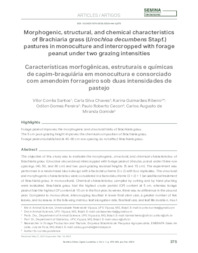Morphogenic, structural, and chemical characteristics of Brachiaria grass (Urochloa decumbens Stapf.) pastures in monoculture and intercropped with forage peanut under two grazing intensities.
Morphogenic, structural, and chemical characteristics of Brachiaria grass (Urochloa decumbens Stapf.) pastures in monoculture and intercropped with forage peanut under two grazing intensities.
Author(s): SANTOS, V, C.; CHAVES, C. S.; RIBEIRO, K. G.; PEREIRA, O. G.; CECCON, P. R.; GOMIDE, C. A. de M.
Summary: The objective of this study was to evaluate the morphogenic, structural, and chemical characteristics of Brachiaria grass (Urochloa decumbens) intercropped with forage peanut (Arachis pintoi) under three-row spacings (40, 50, and 60 cm) and two post-grazing residual heights (5 and 15 cm). The experiment was performed in a randomized block design with a factorial scheme (3 x 2) with four replicates. The structural and morphogenic characteristics were considered in a factorial scheme (3 × 2) + 1 (an additional treatment of Brachiaria grass in monoculture). Chemical characteristics sampled by cutting and by hand plucking were evaluated. Brachiaria grass had the highest crude protein (CP) content at 5 cm, whereas forage peanut had the highest CP content at 15 cm in the first year, however, there was no difference in the second year. Compared to monoculture, intercropping resulted in lower final stem size, a greater number of live leaves, and increases in the following metrics: leaf elongation rate, final leaf size, and leaf life duration, most.
Publication year: 2023
Types of publication: Journal article
Unit: Embrapa Dairy Cattle
Observation
Some of Embrapa's publications are published as ePub files. To read them, use or download one of the following free software options to your computer or mobile device. Android: Google Play Books; IOS: iBooks; Windows and Linux: Calibre.
Access other publications
Access the Agricultural Research Database (BDPA) to consult Embrapa's full library collection and records.
Visit Embrapa Bookstore to purchase books and other publications sold by Embrapa.

